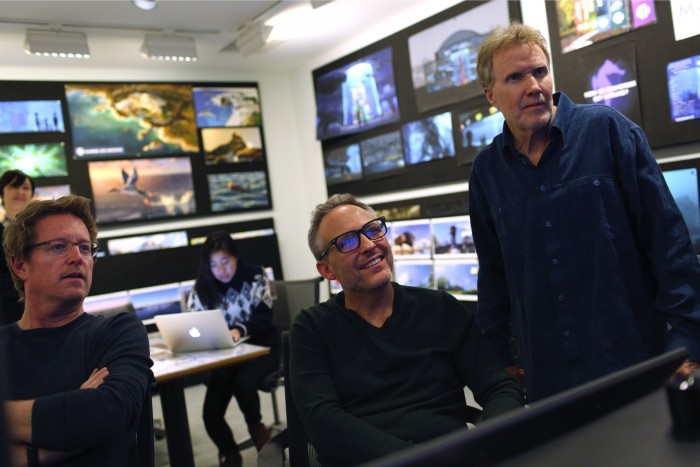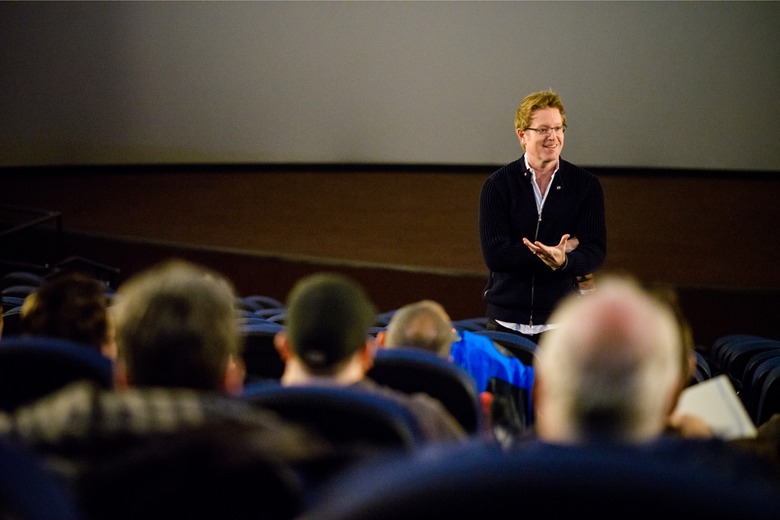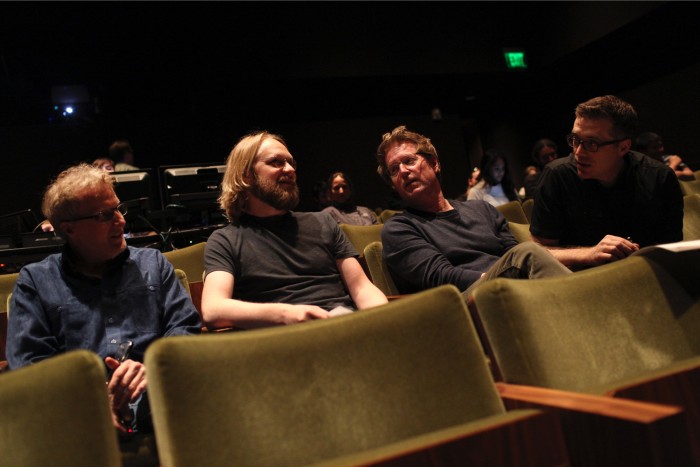'Finding Dory': Andrew Stanton On Why A 'Finding Nemo' Sequel Was Necessary
Finding Nemo director Andrew Stanton has been outspoken about sequels. Like fellow Pixar brain trust member Brad Bird, he has made his feelings known that we need more original stories and that money shouldn't be a reason to make a follow-up. So when Stanton announced that he was directing a Finding Nemo sequel titled Finding Dory, some were surprised. Cynical film journalists were quick to write it off as a filmmaker running back to his successful franchise after the box office disappointment of his live-action debut, John Carter. But the truth is that the idea for Finding Dory came to Stanton before John Carter even hit theaters. It was something that kept him up at night.
Note: the following report is compiled from a roundtable interview and a one-on-one interview with director Andrew Stanton and producer Lindsey Collins.
Stanton wasn't always interested in making a Finding Nemo sequel. When the suggestion of a Nemo sequel would come up from time to time and he would quickly quash it: "no, no, I'm done." So how did Finding Dory come about? The idea came up before Stanton even started working on John Carter, and was something that he thought about for years.
I never watch my movies soon after. And so it had been several years after Nemo came out that I watched it again for something. About six, seven years later. And that probably put a bug in my brain. And then I just remember finding myself starting to think about wow, you know, we never really resolved Dory's issue. 'Cause I felt she had one. And that she was truly a little insecure on the inside and felt that like her short term memory loss was a bit of a burden on people. And that she had to make up for it with her optimism. And I also just worried that she was gonna forget Marlin and Nemo if she got lost. And she wouldn't be able to find them again. And that's probably how she got lost in the first place from wherever she really was from. And then I really felt like wow, that's something I don't want her to have to live with for the rest of her life. And I couldn't drop it. Then I started thinking like, where is she from? And how could she feel better about herself? Sort of the same things that bug me about any other main character that I started to think about in their storyline. And so it's more that I couldn't drop it. ... I remember vaguely feeling that about Dory for a brief moment during a party in Barcelona for the opening of Nemo in 2003. And just thinking like, wow, we still don't have that resolved on her. And then it kind of passed. Then it came up years again years later.
When Stanton first came up with the idea for a possible Finding Nemo sequel, he was very careful not to tell too many people because he knew that it'd be "very hard to put that train back in the station" once it got running. In 2010 he found he couldn't sleep at night because he was thinking about Dory and the character's unresolved issues.
I had already had the idea for like a year, but I was like I cannot let anybody hear this, because the minute I say these two words out loud, everybody's gonna want it. [...] Because yeah, you can't put it back in the box once it's said.
So he kept the idea quiet and privately called Angus MacLane and Bob Peterson into a room at the studio and told them the idea. They worked on the idea at first off the books for a short period of time. They wanted to make sure they were confident in the idea, make sure the timing was right, and see that they could secure the returning voice actors they needed.
The Push Back Against Sequels
Nemo and Dory are beloved characters by many people and Hollywood really does love franchises and sequels. So when Finding Dory was first announced by Disney, there was some negativity from fans who thought it might be a company-driven decision. But for Stanton, it was not that at all.
The truth is it's very knee-jerk and the proper assumption to think that, like, all right, large studio business, money making, let's do a sequel. And let's buy Pixar and do sequels. But the deal was very, very, very clear that we will only do sequels if we think the story's right. And they honored that. They've never come to us with an agenda. They just wait for us to come to them. And just say, now we'd like to do this. Now we'd like to do that. It happens to be, we happen to have three originals in a row or we happen to have this one sequel or this other sequel. And so we've been very sort of separated from any pressures that may be happening out in the marketplace and people watching that and making patterns out of it. They may all be true. But for us, we just are doing the same thing that we've ever done, which is simply just go, okay, we're developing a bunch of stuff and now we like this and now we like that. And now we like this. And the sequels are part of it, we've been very respectful of the original artist. So it was waiting until Pete [Docter] thought it was a worthy Monsters University story and then me suddenly eight years later finally coming up with a spark of an idea. And the same thing with Brad [Bird and Incredibles 2]. Nobody plans to make a sequel 10 years later. It's just one of those things where we just sort of wait until the right time comes for the right story.
I have to admit that I was one of those cynical people who thought that somehow Disney had pushed Stanton and Pixar into another franchise money-making sequel. And while I can't say for sure this isn't that, I can say I have seen 30 minutes of the movie and was surprised at how emotional and dark the film's opening was. Its so unexpected, and renews my faith in this project. The later footage showing the adventures and new characters in the Marine Research Facility was not as strong as the early bits, but I'm very interested to see where it all goes.
What Stanton Learned From John Carter
Stanton admits that he learned a lot while making his first live-action film John Carter for Disney, and he seems sincerely grateful to be working on a movie that, as he sees it, we know people are interested to see. As for his takeaways from John Carter, he's tried to emulate the immediacy that just doesn't exist in the animation world.
There's an immediacy to live-action that just fundamentally doesn't exist in animation. And there's a spontaneity to things. And I really got addicted to it in liv-action. Just like being scrappy and having to think on your feet and basically you gotta make a decision now 'cause you have a certain amount of setups you gotta do. And that sort of momentum was really addictive. And also just how much you can do even more limitations set up on you. Even with everybody meaning to, when you're in animation there's something in the back of your mind that kind of knows, like you still have tomorrow to fix it if you have to. If you really, really, really fail. We might still like be able to make up our homework on the weekend. And I really do think that in a weird way that kind of caps sometimes your smart thinking. And even myself included. And so I don't know a way around that. I mean, Lindsey knows I try to work really fast and really put restrictions on it so that we can just move. And sometimes that's not only to have time at the end of the run, but it's also just to see, all right, do we just work differently? Do we come up with different solutions for working at that pace? I got to admit, I suddenly felt smarter and I do think there is some sort of bio rhythm that I like to work at that on the last quarter of this four year run than I did on the first three. And I think that that rhythm is more natural in live action and I just found like I was just, I was suited for that pace.
What About Finding Nemo 3?
Stanton never believed he would be making a sequel to Finding Nemo. He believed the story was a closed circuit, and he believes the same thing now about Finding Dory. But he's the first to admit that while he doesn't currently think a Finding Dory sequel is a possibility, "you never know" if inspiration will pop up to continue the story and revisit the character.



